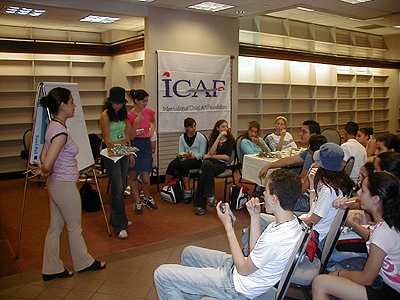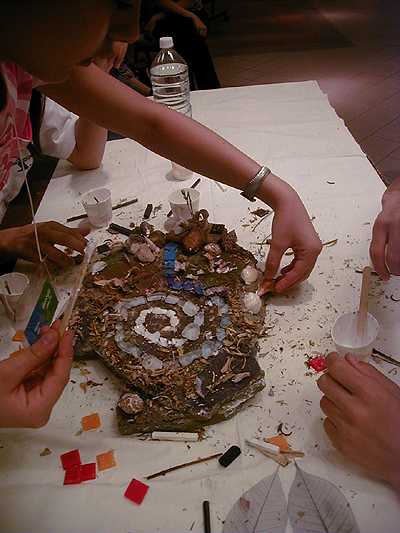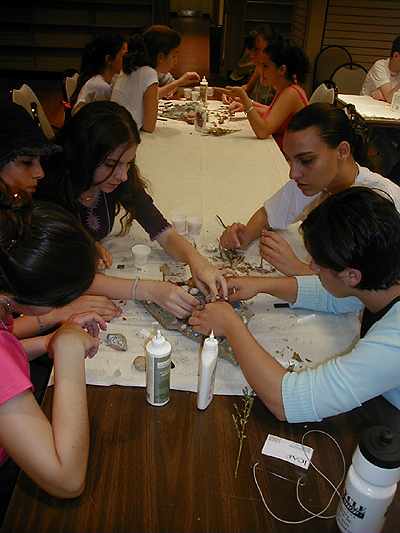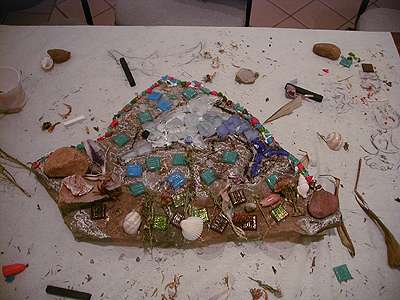|
A
Piece of Cyprus Crafting Peace

By
Rocío
Campos
Program Associate
International Budget Project at the Center on Budget and
Policy Priorities
Washington, DC
TFF Peace Antenna
July 30, 2002
The opportunity to participate in the Peace through
Art Program with the International Child Art Foundation
(ICAF) and the Fulbright Commission in order to promote
peace in Cyprus' future sets an amazing example of the
work that the non-profit sector can do in the tenacious
search for peace. With tremendous energy and an open and
agile way of organizing volunteer expertise, ICAF staff
created a unique opportunity to combine art with a
conflict prevention framework. This took place in
Washington, DC and the participants were 10 Turkish
Cypriots and 10 Greek Cypriots aged between 14-16.
The sui generis character of Cyprus is not based on a
current war; however the present territorial divide of
the island poses difficult challenges to the people
living there as they are not able to travel freely, and
do not have the opportunity to meet or get to know one
another. This setting can potentially be a source of
conflict in the future, where either side, i.e. Greek or
Turkish, can develop feelings of superiority based on
language or cultural differences, miscommunication, or
simply lack of trust. For this reason, working at a
conflict/violence-prevention level demands strengthening
communication, finding common traits and values, and
seeing cultural differences as a source of collaboration
and sharing, as opposed to a source of conflict and
division.
The empowerment of youth - as the main component of
this program - through collaborative projects designed to
bring out common values and build a common culture based
on bi-communal elements constitutes the basis for the
three workshops described here. Parallel to these
workshops, conflict elements rooted in the past, living
in the present, and potential in the future were
incorporated into the design of these workshops. I wanted
the participants to explore, discover, and uncover their
perceptions and interpretations of their past, present,
and future through art activities that would build
trusting relationships and share joy as well as promote
cross-communal recognition, rapprochement, and ultimately
assist a better understanding of 'the other'.

Rocio leading the
workshop
LOOKING THROUGH OUR
HANDS
The first workshop was intended to take the students
to the essence of the human condition, where historical
interpretations, nationalities, and ethnicity are blurred
by the primary need of expression, communication, and
collaboration, using rudimentary tools where hands become
the most ancient and versatile of all instruments. The
warm-up exercise of this session was to identify the
origin of Greek and Turkish paintings, frescoes, tiles,
and architecture looking at a series of slides to
highlight the common traits of Turkish and Greek art and
raise awareness of the roots and history they all share.
The exercise illustrated the similarities in their
origins and prepared them to work in four groups of five,
where gender and background were carefully combined.
The assignment was to work together on a piece of
stone to decorate it using materials such as stones,
pebbles, shells, dry petals and leaves, tile, charcoal,
and imagination to convey a message they wanted to tell
the other groups. The message or theme would be something
the members in each team shared or had in common. The
results were remarkable. The groups selected deep,
insightful themes for their stone projects, such as, a
circle of hope made by leaves blown by the wind which
also created a question mark depending on the position of
the stone. Another group designed a dolphin in the middle
of the sea to express their concern for a clean
environment in which species can survive. A third team
explored the balance in nature and decorated their stone
as summer and winter. The last group decided to work on a
calm, peaceful beach and ocean scene, as something all
Cypriots have in common and can share. After everybody
was finished, the different groups presented their
projects and received feedback from the other teams. The
themes selected for this assignment represent a tangible
example of communication and collaboration where the
common values and key elements of peace, such as sharing,
hope, a clean environment, and nature in balance, were
indeed brought to the working table by young Cypriot
hands.

Art in Progress - A Circle of
Hope, or a Question?
PATCHING THE
PRESENT
The second workshop was an opportunity for the
students to work together in five groups of four to cut
out images, shapes, letters, words, phrases, or
paragraphs from Greek and Turkish Cypriot newspapers to
create an article, poem, story, or song. The only rule
was to use both Greek and Turkish words. The session
started by brainstorming about all the different kinds of
news one reads in the newspapers and about imagining the
types of headlines one would like to find. By using both
Greek and Turkish words, the kids' individuality was
empowered as they explained the meaning of words to the
other members in each team in order to create something
together. One of the teams imagined a Cyprus football
team with Greek and Turkish Cypriots and cut out a map of
Cyprus with green letters across it which read, "No More
Green Line".
The kids worked together by listening to each other
and creating something through which their language
difference worked as a source of mutual enrichment and
bonding. Peace is not about dissolving or ignoring
cultural differences, but about sharing, learning, and
understanding cultural differences. Another team's poem
started with two hands far away from each other and,
towards the end, after a dialogue in Greek and Turkish
was exchanged the hands appeared intertwined. The
opportunity to cut and paste and make collages out of
local Cypriot newspapers is a way of transmitting a
tangible sense of empowerment, where one can change the
news, dictate the present, change events, and be capable
of telling one's own story, one's own dream.

Groups working together to
create works of cooperative art
SKETCHES OF THE
FUTURE
As the kids head toward the end of the program, the
last workshop we have together should help them explore
their perceptions of one another and give them something
they can exchange with each other and take into the
future. A Greek Cypriot drew the portrait of a Turkish
Cypriot and vice versa. Some kids were more comfortable
than others. Some did not like how they were seen. Others
took pictures with their cameras with the portrait next
to their face, but they all signed them and dedicated
their work to their model and friend. This session, like
the others was followed by some debriefing questions to
explore how they felt, if they were confident or afraid
when looked at by the other, and why.
By this time, after several weeks of intensive
community-building, the kids were very open in expressing
themselves. As we were showing the portraits to the class
so they could identify their peers, Christos' portrait
stood out. His talent was evident as suddenly the whole
class started clapping to show their respect and
admiration for their Greek friend's work. Maybe Christos
will become a painter; maybe Melis will become a singer;
maybe Vasiliki will become a journalist; maybe Ulas will
become a doctor. Whatever these kids decide to do in the
future they need to know now that they can make a
difference, that envisioning the future in the present is
already the beginning of change.

One of the groups created this
beautiful dolphin
ooooooooooooooooooooooooooo
International Budget Project at the
Center on Budget and Policy Priorities
820 First St, NE, Suite 510,
Washington, DC, 20002
Tel: 202 408 1080 Ext 365
Fax: 202 408 1056
campos@cbpp.org
www.internationalbudget.org
www.cbpp.org
©
TFF & the author 2002

Tell a friend about this article
Send to:
From:
Message and your name
|